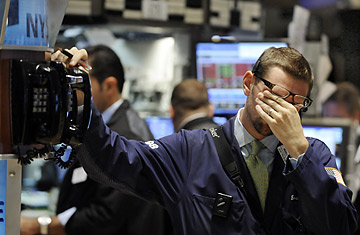
Trader Bradley Silverman rubs his eyes as he works on the New York Stock Exchange floor.
Environmentalists are often accused — not always unfairly — of overplaying the fear card. With apocalyptic references to melting polar ice caps, rising sea levels and widespread species extinction, the driving message of environmentalism is that the future is doomed, unless we act now to save it.
But what happens when another more alarming, more immediate catastrophe co-opts people's fear? That's the predicament greens find themselves in now, with what is potentially the worst financial crisis since the Great Depression scaring Americans out of their wits. With the tanking economy dominating the news, and the government willing to virtually bankrupt itself to bail out the financial sector, it could be hard to push the climate change agenda — and possibly hard to find any money left to support it. "If this crisis consumes all of our attention, it might definitely impact the speed at which [global warming] legislation could be passed," says Wiley Barbour, the founder of the American Carbon Registry. (Listen to Barbour talk about the effect that the financial crisis will have on global warming action on this week's Greencast.)
Already this election season, concerns about the economy have trumped those about the environment. The 2008 Presidential election was supposed to be the first one in which global warming would be the front-and-center issue, but that hasn't been the case. (Though it is worth noting that for the first time, both candidates are on record supporting cap-and-trade legislation for greenhouse gases.)
As panic over rising gas prices outplayed fears of melting Arctic ice, the Republican call to "drill, baby, drill" got louder and more popular, eventually pushing Democrats, including Barack Obama, to publicly support some amount of offshore drilling. The flip-flopping came on the heels of the Senate's defeat of the Warner-Lieberman bill — the first real attempt to pass federal cap-and-trade legislation — thanks in part to fears raised by Republicans that a carbon cap would further increase energy prices. "America's growing dependence on fossil fuels, once viewed as a Democratic trump card...has become a lodestone instead," wrote the green pollsters Michael Shellenberger and Ted Nordhaus in a recent piece for the Los Angeles Times. The ensuring financial meltdown hasn't helped. Since the climate bill was defeated on June 6, the Dow industrial average has lost some 2,000 points. "I think the financial crisis will strengthen the hand of opponents of carbon trading on both the left and right," says Nordhaus.
The credit crunch is also crunching funding for new clean-energy projects. When the global economy was surging over the past several years, fossil fuel prices were surging as well; the cost of oil exceeded $150 a barrel at one point this year. The economic slowdown has shrunk those prices just as quickly, with oil now dipping below $95 a barrel. That makes renewable energy projects like wind and solar, which have to compete with fossil fuels on straight cost until a carbon price is passed, less attractive. Michael Liebreich, the chairman of the research group New Energy Finance, argued in a recent briefing that the financial crisis might make governments less willing to extend preferential subsidies and incentives for clean power, as a sinking economy makes high energy prices sting a little more. "In country after country, the web of support mechanisms for clean energy is now under review," he wrote.
So what should greens do to avoid irrelevance, now that Hank Paulson is replacing Al Gore as the nation's chief scold? First, tie environmental rescue to economic recovery, by "greening the bailout," as columnist Tom Friedman of the New York Times has put it. As the new Administration — whether Democratic or Republican — searches for ways to stimulate the economy, green infrastructure spending could be the way to go. More money for high-speed rail, tax credits for new solar systems, increased federal funding for renewable energy — these are policies that might not only help stimulate a flagging economy, but directly contribute to slowing the growth in America's carbon emissions. (Not to mention promoting green jobs at a time when unemployment is on the rise.) The challenge will be tactical: convincing Americans that curbing climate change is as much about overhauling a failed economy as it is about limiting carbon emissions. That message didn't get across during the debates over Lieberman-Warner; the next President and Congress will need to do better. "Addressing greenhouse gases and addressing the economy are all part of the same problem," says Barbour. "This is absolutely a top priority. It can't be postponed forever."
The good news is that Congress has already added a tinge of green to the bailout. The bill, which passed the House of Representatives on Oct. 3 and should be signed soon by President George W. Bush, includes a long-awaited extension of tax credits for the clean energy sector, which had been due to expire at the end of the year. But if this really is the Great Depression 2.0 and we all end up on the street selling apples and iPods, well, at least our carbon emissions will fall.
